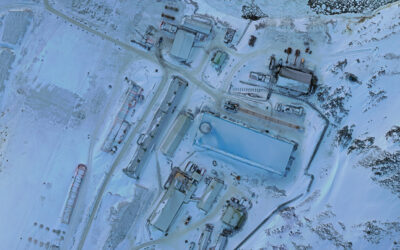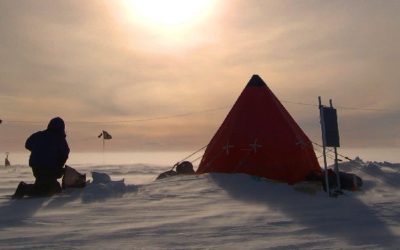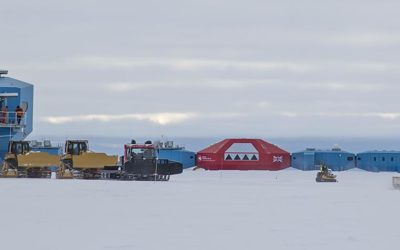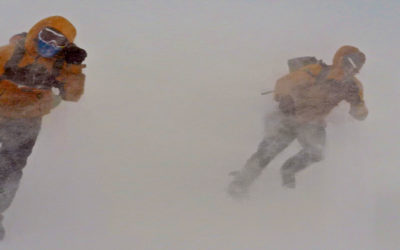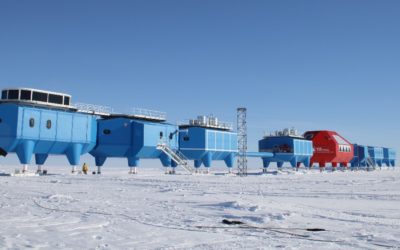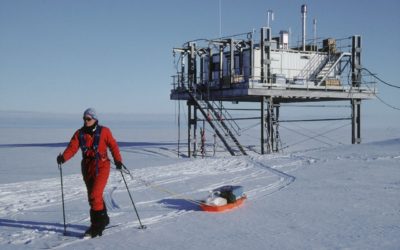
Clean Air Sector Laboratory (CASLab)
Specialised observatory with a suite of instruments to measure the air and snow chemistry around Halley.
Halley Research Station is an internationally important platform for global earth, atmospheric and space weather observation in a climate sensitive zone. Built on a floating ice shelf in the Weddell Sea, Halley VI is the world’s first re-locatable research facility. This award-winning and innovative research station provides scientists with state-of-the-art laboratories and living accommodation, enabling them to study pressing global problems from climate change and sea-level rise to space weather and the ozone hole – first discovered at Halley in 1985.
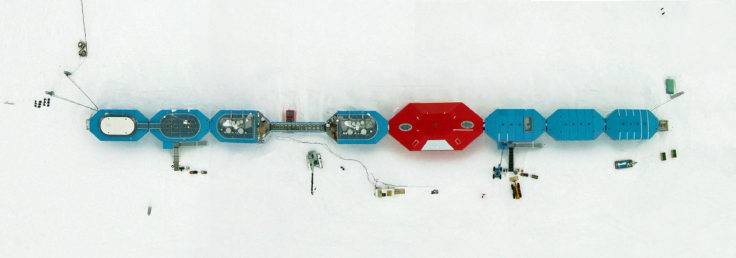
Space weather data captured at Halley VI contributes to the Space Environment Impacts Expert Group that provides advice to Government on the impact of space weather on UK infrastructure and business.
Data gathered by scientists at Halley as part of European collaborative projects such as SPACESTORM. By generating more accurate space weather forecasts, this science is helping to reduce the impact of space weather events on satellites.
In 2013, Halley was made part of the network of 30 stations across the globe that form the World Meteorological Organization’s Global Atmosphere Watch (GAW) programme, becoming the 29th in the world and 3rd in Antarctica. Together, these stations provide reliable information on the chemical composition of the atmosphere and how it is changing.
Measurements of ozone, as well as meteorology, have been made at Halley since it was established in 1956. This long-term data enabled British scientists to discover the hole in the ozone layer in 1985.
At Halley typical winter temperatures are below -20°C with extreme lows of around -55°C. There is 24-hour darkness for 105 days per year.
The state-of-the-art research facility is segmented into eight modules, each sitting atop ski-fitted, hydraulic legs. These can be individually raised to overcome snow accumulation and each module towed independently to a new location. This was required during the 2016/17 Antarctic summer season, when BAS successfully relocated Halley to its new home on the Brunt Ice Shelf. Operational teams spent 13 weeks moving each of the station’s eight modules 23 km upstream of a previously dormant ice chasm.
The central red module contains the communal areas for eating and socialising, while the blue modules provide accommodation, laboratories, offices, generators, an observation platform and other facilities. Halley also has a snow runway and supports a number of summer field science activities.

Halley sits on the 130 metre-thick Brunt Ice Shelf. The ice shelf flows slowly out onto the Weddell Sea, where chunks of ice ‘calve’ off as icebergs.
As the ice beneath Halley flows away from the mainland, the risk of calving increases. To predict calving events, the ice shelf movement is monitored via seven GPS sensors known as the ‘Lifetime of Halley’ network.
Each sensor uses a dual-band GPS receiver to accurately determine its position and dynamics, before reporting this back to a base station at Halley VI. The data is used to study the strains and tidal flexes in the ice shelf, so that we can predict when and where future calving will take place.
Operational since 2012, Halley VI is made up of a series of eight interlinked pods. Built on skis, the pods can be towed across the ice by specialist heavy vehicles. Being able to move the research station is vital because of its site on the Brunt Ice Shelf, which is constantly moving towards the Weddell Sea.
Monitoring revealed in 2015 that Halley was downstream of a widening crack in the ice shelf (known as chasm 1). As a result, the research station was relocated to a new, safer site in 2016/17.
Working in the Polar Regions is challenging. The success of our science and operations depends on a wide range of people who are experts in many disciplines. Halley accommodates up to 70 staff during the summer (late December to early March) and has previously had 16 over-wintering staff or ‘winterers’. In January 2017, as a safety precaution, the Director of BAS took the decision not to winter a team at Halley following the detection of new and unpredictable ice crack on the Brunt Ice Shelf. This will remain the case for the foreseeable future.
Following the decision to operate Halley VI as a summer-only station until the Brunt Ice Shelf stabilises, BAS scientists and engineers are this season continuing to work on automating instruments at the station to enable ongoing data collection throughout the Antarctic winter when the station is unoccupied. These instruments ran successfully over the 2019 winter. The Halley automation project consists of a micro-turbine power supply and datalink to a suite of autonomous scientific instrumentation around the station and on the ice shelf.
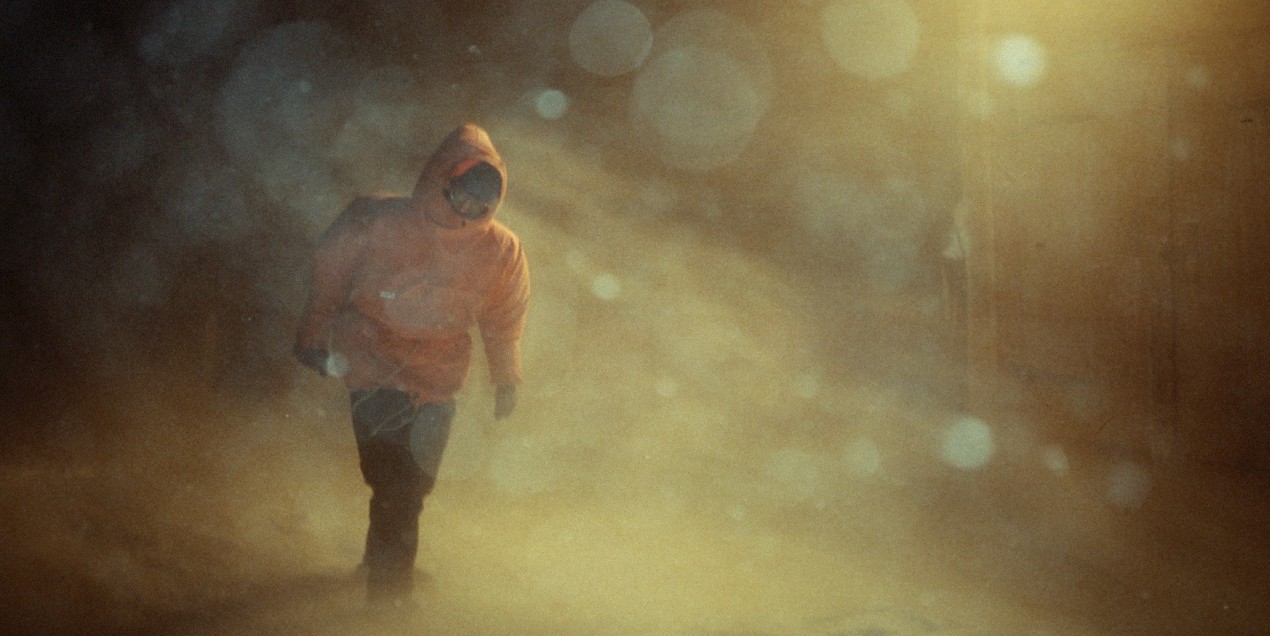
Temperatures at Halley rarely rise above 0°C although temperatures around -10°C are common on sunny summer days. Typical winter temperatures are below -20°C with extreme lows of around -55°C. Check out today’s Halley weather data here.
Winds are predominantly from the east. Strong winds usually pick up the dusty surface snow, reducing visibility to a few metres.
Approximately 1.2 metres of snow accumulates each year on the Brunt Ice Shelf and buildings on the surface become covered and eventually crushed by snow. This part of the ice shelf is also moving westward by approximately 700 metres per year.
One of the reasons for the location of Halley is that it is under the auroral oval, resulting in frequent displays of the Aurora Australis overhead.
These Aurora are easiest to see during the 105 days when the sun does not rise above the horizon.
Halley Research Station is designed to provide UK polar researchers and their collaborators with access to state-of-the-art facilities for studying a wide range of disciplines, particularly in the field of atmospheric sciences, space weather and glaciology.
Science at Halley VI provides vital information for a global understanding of space weather, ozone depletion, polar atmospheric chemistry, sea-level rise and climate change. Since it was first established in 1956, meteorological and atmospheric data has been continually collected at Halley.
Situated in the auroral zone, Halley is ideally placed for research into space weather. Data from Halley is used to generate space weather forecasts that help to protect satellites, more than 1,000 of which now orbit the Earth to provide our telecommunications, finance and banking infrastructure.
Halley is one of the 30 stations across the globe that make up the World Meteorological Organization’s Global Atmosphere Watch (GAW) programme. Together, these stations provide reliable information on the chemical composition of the atmosphere and how it is changing.
Meteorological and atmospheric data have been continually collected at Halley since 1956, providing an invaluable long-term record. Meteorological observations are made throughout the day. Temperature, humidity, sunshine, pressure, wind speed and direction data are collected from automated instruments, while observers still collect data on clouds and weather phenomena such as diamond dust, halos, mirages and the Aurora Australis.
These observations are sent via geostationary satellites to meteorological centres where, together with observations from across the world, they are used to produce accurate weather forecasts and for climate change research.
Ozone measurements have also been made at Halley since 1956, long-term data that enabled British scientists to discover the hole in the ozone layer in 1985. Their discovery led to the Montreal Protocol, an international agreement banning ozone-depleting chlorofluorocarbons (CFCs).
Remote scientific equipment, set up for long-term monitoring, is housed in a number of cabooses around the perimeter of the site, which also contains numerous aerials and arrays for studying atmospheric conditions and space weather.
As well as being ideally sited for studying space weather, Halley is a unique natural laboratory for research into human space flight because of its isolation and long periods of darkness. Keen to discover how such conditions might affect astronauts on long space flights, staff at Halley are taking part in experiments with the European Space Agency. This project supports UK Government policy (2015) for the human exploration of space.
Together with colleagues at the French-Italian research station Concordia, they are using a cockpit simulator used to train astronauts in docking at the International Space Station to find out how well these skills are maintained during long periods of darkness and isolation, information that will help keep future astronauts safe.
Automated equipment, such as automatic weather stations and ice movement monitoring sensors, collects data year round. BAS is expanding the amount and scope of its automated technologies.
A micro-jet turbine is being developed (2017) to provide 15kW-level mains power through the winter. This will enable many more of the science experiments at Halley to run year-round. This level of power will keep an internet connection to the station and the equipment throughout the winter months. Engineering and technology teams are working on a process for automating a number of instruments, notably an automatic version of the Dobson spectrophotometer for monitoring ozone in the stratosphere, and some automated air chemistry experiments.
Engineers are conducting trails (2017-18) of a methanol fuel cell which, along with solar panels, will give around 100W of power that can be used to power individual experiments with no dependencies on other infrastructure. Initially this will be used to power an alternate method of measuring stratospheric ozone.
A number of stand-alone instruments are being deployed to use deep field, these tend to be relatively small solar and wind powered instruments. These include three Very Low Frequency radio receivers (associated with space weather) and an atmospheric chemistry instrument.
Project Manager - Rothera Renewable Energy
AIMP, Meet the Antarctic Infrastructure Modernisation Programme Team

Specialised observatory with a suite of instruments to measure the air and snow chemistry around Halley.
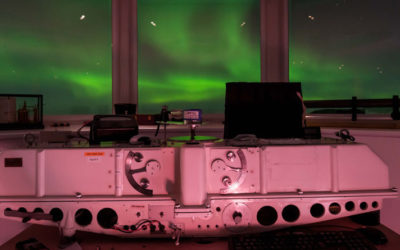
The instrument that led to the discovery of ozone depletion over Antarctica
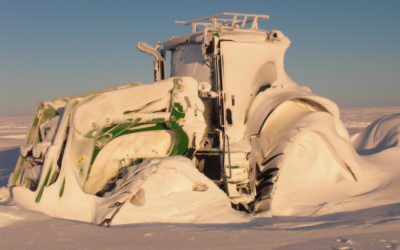
Halley Research Station is the British Antarctic Survey’s most southerly Research Station and is built on a floating ice shelf. All the vehicles at Halley are tracked and can be …
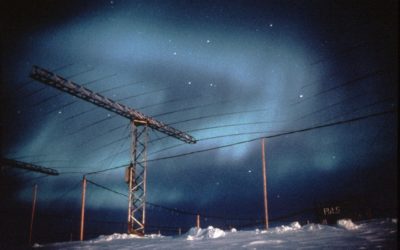
Studying winds, waves, and tides in the upper atmosphere across the polar regions.
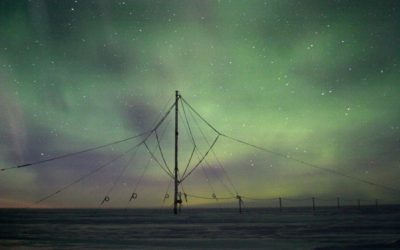
The Halley VLF receiver listens to very-low frequency radio waves as part of a network of receivers located all over the polar regions. The data gathered by this network is used by …
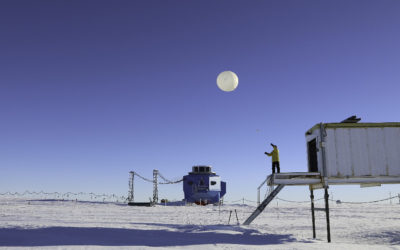
At Halley, balloon launches take place every day at 11am. A device called a radiosonde hangs beneath the helium-filled balloon and measures temperature, pressure and humidity. From GPS we can …
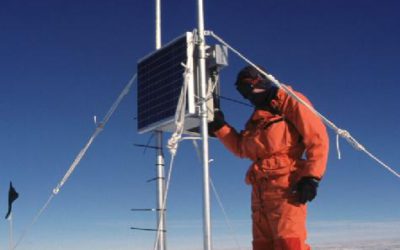
Search coil magnetometer Several kinds of natural waves in the ultra-low-frequency (ULF) range are generated in Earth’s space environment (the magnetosphere, bounded by Earth’s magnetic field as it extends into …
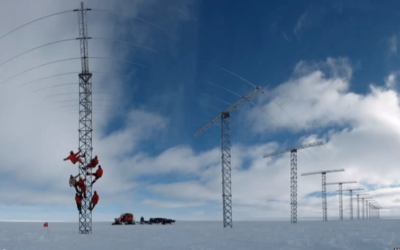
Met tower Meteorological scientists at Halley have been measuring the weather in great detail and with ever more sophisticated gadgets since the station first opened over 50 years ago. Instruments …
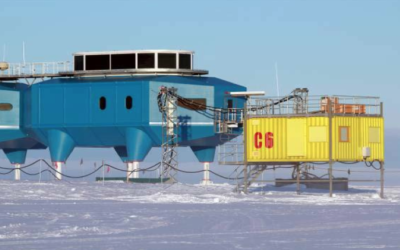
The microwave radiometer enables us to gain a better understanding of the chemistry and physics of the polar middle atmosphere, 35–90km above the ground, and how it affects climate. For example, …
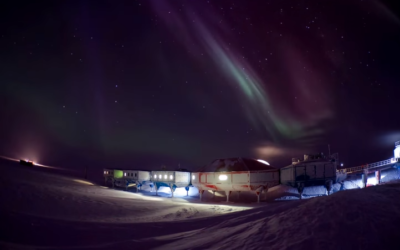
Bomem The Bomem has been operating at Halley periodically since 2002. It’s a spectrometer: an instrument that splits light into its component colours. It is designed to look specifically at …
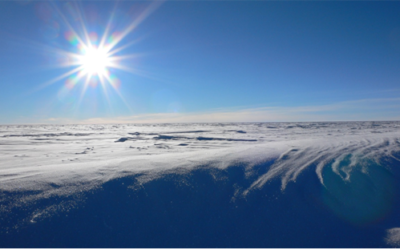
The riometer at Halley measures the radiowave noise at 30MHz coming from the Galaxy. Typically there is a gentle variation of the noise during each day as the Earth turns …
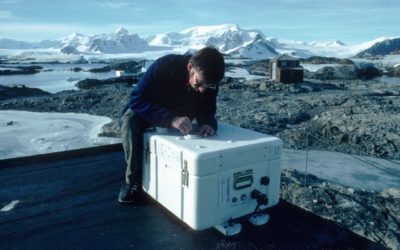
SAOZ measures sunlight scattered from the overhead sky in a way that allows us to calculate how much of the atmospheric gases ozone and nitrogen dioxide the light has passed through …

Halley Research Station - Module Layout
19 April, 2024 by Emma Pearce
Understanding what is going on inside an ice shelf is important for many reasons. But mostly, it allows us to better understand their contribution to sea level rise, and to …
30 December, 2023 by Emily Newton
Every year at British Antarctic Survey is a huge team effort. What we do couldn’t happen without every one our talented staff – whether they are doing the legwork of …
2 February, 2022 by Emily Neville
Neil Brims is the Electrician at Halley VI Research Station. In our latest blog, find out what life is like at Halley and how it feels to live at the …
1 November, 2019 by Robert Taylor
Mapping in Antarctica – podcast
6 March, 2017 by Ben Rowe
This is Part 2 of a guest blog written by Ramboll engineer Ben Rowe, who was embedded with the British Antarctic Survey for 11 weeks to advise and assist with …
3 March, 2017 by Ben Rowe
This is Part 1 of a guest blog written by Ramboll engineer Ben Rowe, who was embedded with the British Antarctic Survey for 11 weeks to advise and assist with …
5 February, 2016 by Athena Dinar
“I feel like I’m home” says BBC weather forecaster Peter Gibbs as he sets foot on the Brunt Ice Shelf. It’s an emotional moment for him; the last time he …
27 January, 2016 by Athena Dinar
Ten days ago we left Cape Town on the RRS Ernest Shackleton bound for Antarctica. Today we hit the ice. And quite literally we are hitting the ice! The ship …
20 November, 2015 by Thomas Welsh
New summer season starts at Halley
18 May, 2014 by John Mann
May was another busy month at Halley with the loss of the sun and the temperature dropping even further making our everyday tasks down here that little bit more challenging. …
18 April, 2014 by BAS Bloggers
With the first round of Winter Training Trips concluded April saw the wintering team here at Halley VI settling in for the long, cold winter to come. You could say …
18 March, 2014 by Richard Warren
March has been a busy month for all of us at Halley station. Following the departure of the RRS Ernest Shackleton in February, March saw the continuation of winter trips, …
24 February, 2014 by Michal Krzysztofowicz
February was a really busy month at Halley. The month has started with the arrival of Summer Science Staff on the RRS Ernest Shackleton – this was the second Shack’s …
24 January, 2014 by BAS Bloggers
It was a strange way to welcome in the New Year, standing outside the modules at Halley, at midnight with a clear sky above us and the sun glaring down, …
17 December, 2013 by BAS Bloggers
1800 drums of fuel, 650kgs of potatoes, 3 cubic meters of toilet paper and a drum kit. This is just a small selection of items that have arrived this year …
30 November, 2013 by BAS Bloggers
Having spent a winter in isolation on the Brunt ice shelf we were all very excited as the first plane landed on the runway bringing people and freshies. More than …
31 October, 2013 by BAS Bloggers
It’s October now and the length of daylight is increasing rapidly at this time of year. It only seems a few weeks since we were in total darkness yet we …
30 September, 2013 by BAS Bloggers
With the ever-increasing light and (occasionally) improving weather, September felt like we were truly beginning to leave winter behind. Although the true start of the summer season is not until …
31 August, 2013 by Agnieszka Fryckowska
Winter has been with us for a while but during the beginning of August we get the first glimpses of the sun raising itself. Skies are spectacular during the day …
31 July, 2013 by BAS Bloggers
With the build- up and celebration of mid-winter over, July started with the winter teams six-monthly dental checks. Having had our teeth checked and treated before leaving for the Antarctic …
30 June, 2013 by BAS Bloggers
Doctor’s Report Summary: Sun above the horizon – 0 days, 0 hours, 0 minutes, 0 seconds Max Wind Speed – 81 knots Min Temp – −48°C (-62°C Midwinter’s Week Fun …
31 May, 2013 by Agnieszka Fryckowska
So it’s May, the flag has gone down, days are dark, it’s cold and yes winter is well and truly here at Halley. What on earth do we do on …
30 April, 2013 by BAS Bloggers
The month of April really brings home the prospect of the upcoming 100 days in which we will not see the sun at all. The nights draw in ever more …
31 March, 2013 by BAS Bloggers
It’s now March, the days are starting to draw in and winter is coming to Antarctica. It’s that time of year when anyone not staying for the approaching winter (or …
28 February, 2013 by BAS Bloggers
February, the shortest month of the year and probably the most jam-packed one, here at Halley VI. 28 busy days with almost every day filled with an event, the station …
31 January, 2013 by BAS Bloggers
January… the busiest month of the year. As our regular supply ship, the Ernest Shackleton had now dropped off the last of the long-term arrivals there were a number of …
30 November, 2012 by BAS Bloggers
1st November: As the Winter draws to a close and the last field trip returns the base begins preparation for the arrival of new people. The super warm clothing, specialised …
31 October, 2012 by BAS Bloggers
Life at Windy Bay caboose during the last month of winter A Caboose is a small living container, sitting on sledge at Windy Bay. It was home for me during …
31 August, 2012 by BAS Bloggers
The weekend of the 4th and 5th of August was spent making a short film for the Antarctic Film Festival. Despite being titled ‘What a Drag’, it was really fun …
31 July, 2012 by BAS Bloggers
July was one of the harder months of the Winter. The excitement of mid-Winter had passed and sun-up in August seemed like a long way off. It was also the …
30 June, 2012 by BAS Bloggers
The darkest month of the year and important mid-winter celebration for all the people in Antarctica is what June is all about here in the South. The sun is below …
31 May, 2012 by BAS Bloggers
The month of May started with the lowering of the very weather damaged British flag. This will be the only flag to have been flown above Halley 5 and Halley …
30 April, 2012 by BAS Bloggers
What makes life in Antarctica different to life somewhere else? What drives someone down to the end of the world? What makes it worthwhile or interesting? What about April 2012? …
28 February, 2012 by BAS Bloggers
February at Halley this year, despite being the shortest month, seemed much longer. Everything was about timing. Do we have enough time to make the station ready for wintering? Do …
31 January, 2012 by BAS Bloggers
January often starts with a hangover and usually marks the end of the busy festive season. At Halley, folk were half-way through relief, back-loading waste onto the Ernest Shackleton and …
31 December, 2011 by BAS Bloggers
I arrived at Halley on the 2nd of Dec after spending the previous week travelling through Cape Town and Novo with ALCI. The journey was particularly smooth and even got …
30 November, 2011 by BAS Bloggers
It was to be another very busy start to what would be another very season. The first of many flights and transits were due out on the 23rd Oct 2011, …
31 October, 2011 by BAS Bloggers
Well it’s finally my turn to write a month. My name is Paul Barwick and I am the wintering Electrical Service Technician here at Halley and if all goes to …
30 September, 2011 by BAS Bloggers
We are fortunate enough at Halley to have an Emperor Penguin colony at “Windy Bay”, about 20Km from base. Naturally everyone is keen to see them. So I thought I …
31 August, 2011 by Brett Walton
By far the most important event that occurred in August was the appearance of the sun above the horizon for the first time in over three months signalling the beginning …
31 July, 2011 by BAS Bloggers
So what went on in July? To be honest with you I’m now writing the diary and its the end of August so I’m having to trawl the memory banks …
30 June, 2011 by BAS Bloggers
The following events took place between 1st June and the 30th of June Welcome to the June diary, June has been a busy month for all of us on station, …
31 May, 2011 by BAS Bloggers
The sun sets for the last time May already… wow. One thing I’ve noticed since arriving down at Halley is just how quickly the time has flown by. It doesn’t …
31 March, 2011 by Christopher Walton
Well it was almost a year to the day that I was on the Ernest Shackleton and waved goodbye to the winter team of 2010 as they stood on the …
28 February, 2011 by BAS Bloggers
February started with a bang. As part of BAS winter training we have an annual major incident scenario to make sure we are all ready and well rehearsed just in …
31 January, 2011 by BAS Bloggers
Happy New Year from Halley base Antarctica! As 2011 was rung in, I was ‘fresh off the boat’ (RRS Ernest Shackleton) having sailed from the UK eight weeks previously. In …
31 December, 2010 by BAS Bloggers
The summer season at Halley is the busiest, most important time in the Halley V calendar. Whilst the science and maintenance activities continue all year round it is during the …
30 November, 2010 by Penny Goodearl
This is my first visit to Antarctica. Being here is an adventure. Getting here was an epic journey. At 23.30pm on 11 November we left Cape Town on board a …
31 October, 2010 by BAS Bloggers
So here we are the final month of our winter. I will finish it how I started, by writing the diary. It has been a great winter with so many …
30 September, 2010 by BAS Bloggers
The month of September, so often associated with dew on the ground, the rustle of crisp leaves and woodsy aromas back home in the UK, brings a starkly contrasting ambience …
31 August, 2010 by BAS Bloggers
August already and according to the Halley planners, as it stands, we will soon see our winter finish in just shy of 2 months, but all is not lost! Our …
31 July, 2010 by BAS Bloggers
I thought I had drawn the short straw having to write the diary for July because, with no birthdays to celebrate and mid-winter festivities behind us, I suspected there might …
30 June, 2010 by BAS Bloggers
Well here is the June diary, a chance to write something about something? It is now my chance! I’m Craig Douglas Brown, the electrician at Halley and I have the …
31 May, 2010 by Timothy Gee
Changing temperatures Welcome to the May 2010 winter diary. My name’s Tim and I am the wintering vehicle operator mechanic at Halley. So what happened in May then? Well May …
30 April, 2010 by BAS Bloggers
Welcome to the April diary. My name is Matt and I am the wintering Genny mech this year. So what has happened in April? We have had our first proper blows, with …
31 March, 2010 by BAS Bloggers
So here we are at the start of another winter season at Halley! Since late Feb the numbers on base have dropped from 111 to 11. It has been a …
28 February, 2010 by Christopher Walton
It was the beginning of February and I had now been in Antarctica a full 2 months as one of the new summer chefs. The time was flying and everything …
31 January, 2010 by BAS Bloggers
Dear Diary, January, as a month, is usually looked forward to not a lot particularly in the UK where the usual rain and fog takes a break to be replaced …
31 December, 2009 by BAS Bloggers
I’ve now been here just over two weeks. As people become familiar with each other, we get another plane load of new faces and names. For a short while, the …
30 November, 2009 by BAS Bloggers
November started with all hands on deck as we prepared for the first plane to arrive. The electrician Robert (wrongun) Johnson, plumber Robert (zebedee) Dunn and myself were busy de-winterising …
31 October, 2009 by BAS Bloggers
As the last month of solitude for the wintering Halley eleven starts, the base gears up for the first of the new intruders to arrive by air. Everyone is busy …
30 September, 2009 by BAS Bloggers
September saw the first attempt of building an Igloo to which a great deal of time and effort only rewarded us with a half built igloo, which would be nice …
31 August, 2009 by BAS Bloggers
Halley 89022, Antarctica 89022 is the international weather station number for Halley, a figure I write several times a day in the meteorological register and various other places. It has …
31 August, 2009 by Agnieszka Fryckowska
During the winter months on the Antarctic continent not only do we experience 24 hour darkness but we are privileged to see the aurora australis. Here at Halley Station we …
31 August, 2009 by John Eager
It’s early Sunday morning at Halley Research Station, Antarctica. The sun is rising quickly on the horizon, the wind is low and the temperature outside is a modest −18 degrees …
31 July, 2009 by Nicholas Gregory
As the pandemonium of midwinter subsides the reality of Antarctic winter grips us firmly by the throat, a deep red floods the afternoon sky allowing a hint of blue to …
30 June, 2009 by Karen Fowler
Midwinter This is a particularly special month for all of us down here at Halley. It marks the middle of our year and sees the start of our week-long celebration …
30 June, 2009 by BAS Bloggers
As I take off from the ice runway at the British Antarctic Survey’s Halley base, situated on the Brunt Ice Shelf (75°34′S 26°34′W), I finally realise I am living and …
31 May, 2009 by BAS Bloggers
Where’s the sun? After the high winds that blew the last days of April away, we wondered if the breeze would abate to allow us a glimpse of the sun …
31 May, 2009 by Agnieszka Fryckowska
Introducing Halley Station (75°34′S 26°34′W), located on the 150m thick, continually moving, Brunt Ice Shelf in Antarctica. Named after the Astronomer Edmond Halley, the current station (Halley V) is the …
30 April, 2009 by Agnieszka Fryckowska
Extreme is a word I could use to describe April at Halley this year. We hear it often when referred to living in the Antarctic. It was drummed into us …
31 March, 2009 by John Eager
As time is called on March 2009, the 54th Halley wintering team completed its first month alone on the Brunt ice shelf. Nights lengthen and darken, temperatures plummet and the …
28 February, 2009 by BAS Bloggers
Greetings from everyone at Halley base. February was a month where the summer season was in full swing and there were the usual preparations and maintenance programmes being carried out …
31 January, 2009 by John Eager
The New Year rings in on the Brunt ice shelf For the incoming summer and winter teams along with the ships crew the bell rings on bridge of the RSS …
31 December, 2008 by BAS Bloggers
Hello from the new boy. December was a great month for me, my first full month on the station. This of course meant as the incoming Field GA, lots of …
30 November, 2008 by Joe Corner
November, the 11th month of the year, and the 12th month that everyone, apart from Dean, has been living in the Antarctic. After 8 months of just 11 of us …
31 October, 2008 by BAS Bloggers
Hello everyone! I must apologise to all who are not flower lovers, but it seems apt to start this month’s instalment with another flower… plus I like flowers so that …
30 September, 2008 by Agnieszka Fryckowska
September is the ninth month of the year in the Gregorian Calendar and one of four Gregorian months with 30 days. In Latin, septem means “seven” and septimus means “seventh”; …
31 August, 2008 by BAS Bloggers
The Sun Returns Could it be a case of pre-Christmas cheer, or early Christmas gifts, or just pure coincidence? What on earth am I on about? Well… it turns out …
31 July, 2008 by Joe Corner
Red sky at night… July is always a quiet month here at Halley. Midwinter has come and gone, the sky is still dark and sometimes the base feels like a …
30 June, 2008 by BAS Bloggers
Hello and welcome to the Halley June Diary. June is a very important month for all those wintering in Antarctica. This is because we celebrate Midwinter, this is our Christmas, …
30 May, 2008 by BAS Bloggers
The darkness cometh… Darkness came slowly, creeping up on us through April like a tiger stalking its prey. Then, ominously, the morning glow through the dining room windows is marching …
30 April, 2008 by BAS Bloggers
“1, 2, 3, 4, er…d’oh, damn it, I lost count! 1, 2, 3, 4…” By the end of April, the residents of Halley 2008 had experienced “winter” life for just …
31 March, 2008 by BAS Bloggers
March may be the third month in the Gregorian calendar, but to the hardy Antarctic Heroes at Halley, March might as well be the first. You’re probably asking yourself why… …
28 February, 2008 by BAS Bloggers
What a busy month! With so many people on Halley, I suppose it’s no surprise but it’s difficult to know where to start: Halley Lifetime studies, Halley VI construction, panels …
31 January, 2008 by Agnieszka Fryckowska
This months diary is more of a snapshot of life at Halley from a couple of authors: David Stephenson and Agnieszka Fryckowska. We have tried to cover many of the …
30 November, 2007 by Peter Milner
Thump – Thump – Splash’ > Good ‘Thud’ > Bad Leaving aside the strange title of this diary, November has been a pretty eventful month for the Halley crew. We …
31 October, 2007 by Mark Wales
October started for us with some spectacular weather, not so much calm bright and sunny but very windy, the good thing is when it’s windy the temperature tends to be …
30 September, 2007 by BAS Bloggers
One of the great secrets of the Halley winter is that the period after the end of permanent darkness is filled with bad weather. While the fresh-faced eager first year …
31 August, 2007 by BAS Bloggers
August already. How time flies. With the coming of the summer light, many of the yearly jobs can now be undertaken, jobs which have been caused by the relentless Antarctic …
31 July, 2007 by Neil Brough
Some months in the Antarctic calendar are slightly less exciting than others for various reasons but still have enough originality to be enjoyed, more so by the fresh and innocent …
30 June, 2007 by BAS Bloggers
Midwinter Mischief June here was all about Midwinter, the biggest event in the Antarctic calendar. Most people (myself included), spent every spare moment in the run up to Midwinter’s Day …
31 May, 2007 by BAS Bloggers
May be the month of Pirates. No wait, not pirates, I mean Sundown. Or is it Ninjas? I’m going to go with Sundown. A setting Sun, to most people wont …
30 April, 2007 by BAS Bloggers
The Halley Diary for April 2007 was written by Thomas Spieß (FOCAS UAV scientist). English | Deutsch
30 April, 2007 by BAS Bloggers
From the meteorological view the Antarctic autumn lasts from 1st of march to 31st of May. So, April is right in the middle of the Austral autumn. It is the …
30 April, 2007 by BAS Bloggers
Aus meteorologischer Sicht dauert der antarktische Herbst vom 1.3. bis zum 31.5. Somit ist der April mittendrin im antarktischen Herbst. Und man wird sich bewusst: Der Sommer mit seinen angenehmen …
31 March, 2007 by BAS Bloggers
March is an underrated time of year at Halley, falling in the Antarctic Autumn, a season sandwiched between the hustle and bustle of summer and the stunning auroras of winter. …
28 February, 2007 by BAS Bloggers
February is usually an odd month at Halley. The summer ends, the crowds depart, and Halley is left in the hands of the wintering team once again. A huge amount …
31 January, 2007 by BAS Bloggers
Unlike last year, when relief finished by New Years Eve, this year the madness started on New Year’s Day. After a week of the ship being stuck 50 miles from …
31 December, 2006 by BAS Bloggers
Happy New Year! Hope you all had an excellent Christmas as well. It’s been a bit strange here, not being bombarded by the constant Christmas advertising since September it all …
30 November, 2006 by BAS Bloggers
November — Who needs running water? November at Halley saw an average temperature of -9.2°C, average pressure of 978.8hPa, mean scalar wind speed of 14.8 knots. We had 21 days of …
31 October, 2006 by BAS Bloggers
October is a busy month here at Halley. We have many winter trips going on and a lot of other stuff to have the base ready for the summer season, …
30 September, 2006 by Mark Wales
September started for us with temperatures of -40°C and lower, even a simple task of walking to one of the other platforms requires dressing up in full combat gear completely …
31 August, 2006 by BAS Bloggers
August has whizzed by with the return of the sun and the trips to see the Emperor penguins. During the first week of August I was very fortunate to combine …
31 July, 2006 by BAS Bloggers
July traditionally a month of lulls, was full of anticipation and preparations for the return of the sun to brighten up our days. It got off to a swinging start …
30 June, 2006 by BAS Bloggers
June is a month which seems to be largely compressed into a week, the week around our winter solstice. Midwinter is a big issue down here, signifying the point at …
31 May, 2006 by BAS Bloggers
Hello from Halley. This month started off with the May Bank Holiday. In the absence of a maypole we considered dancing round one of the Comms masts but the idea …
30 April, 2006 by BAS Bloggers
Well, another month passes at Halley. For me, April started with a week on nightshift. As well as the pleasure of cleaning the toilets every night, this was also a …
31 March, 2006 by BAS Bloggers
Working Hard Winter is on its way. Halley feels almost empty as the summer crowd have escaped and left sixteen happy souls to make the place their own. March is …
28 February, 2006 by BAS Bloggers
A few words from Alex Gough — Winterer for 2006 Well, everyone’s about to leave us in peace. Almost everyone went early on Saturday morning, but five or six spare …
31 December, 2005 by BAS Bloggers
New faces At the beginning of the month with the arrival of the aeroplanes new people come to Halley. Basler DC3 The first arrivals to break the Winter isolation were …
30 November, 2005 by BAS Bloggers
First visitors It feels strange to recall the end of the winter now that summer is in full swing! During November we went on the last of the post winter …
31 October, 2005 by BAS Bloggers
Perpetual Sunlight Well the month started with a long storm with the pressure dropping off the charts (for those met geeks among us). This kept the Sledge Golf party (Kev …
30 September, 2005 by BAS Bloggers
The Last Aurora! Are you sure it’s September already? I’m sure it’s already been said but it is amazing how quickly time passes down here. The beginning of the month …
31 August, 2005 by BAS Bloggers
Sun Up!, written by Mike Rooney As usual, August was a busy, fun packed month. We found ourselves looking eagerly towards the Northern Horizon for a brief hint of the …
31 July, 2005 by BAS Bloggers
Another month passes quickly, written by Jamie Koplick (Heating/Ventilation Engineer) The month began pretty much the same as all the others, without me realising it! Time really does fly down …
30 June, 2005 by BAS Bloggers
Midwinter celebrations, written by Bryn Jones (AIS Engineer) June began where May left off, with the temperature hovering around the very chilly mark of -50°C. However, life inside our warm …
31 May, 2005 by BAS Bloggers
Sundown The month started with the yearly Sundown ceremony, to mark the day that the sun disappears and we start three months of darkness. As the oldest member of the …
30 April, 2005 by BAS Bloggers
A Chef Writes – knocked together by Kevin (the Sheff-Chef) O’Donnell This month started off with winds of 40 knots and temperatures of −30°C and pretty much stayed the same …
31 March, 2005 by BAS Bloggers
Winter Trips Deutsch March is always an exciting time at Halley because after the ship has left, winterers begin their winter trips. It is our type of holiday down here …
31 March, 2005 by BAS Bloggers
M�rz 2005 – Winter Trips English Der Monat M�rz ist in Halley immer ein besonders spannender Monat, weil die �berwinterer, nachdem das Schiff Halley zum letzten Mal f�r dieses Jahr …
28 February, 2005 by BAS Bloggers
Goodbye to the Shackleton by Craig Nicholls It was a month in which we said goodbye to old friends, the ones who worked all summer getting the base ready for …
31 January, 2005 by BAS Bloggers
Hoc of Halley by Hoc Baldock, Summer Admin Support After working for BAS for 14 years you feel you know a bit about it, but how different the reality can …
31 December, 2004 by BAS Bloggers
Summer arrives by Simon Coggins December is always a hectic month at Halley as it signals the end of the months of isolation and the beginning of the busy summer …
30 November, 2004 by BAS Bloggers
Preparations for Summer By Russ Locke November has been a busy month here at Halley with preparations for the coming summer season well and truly underway. As the winter begins …
31 October, 2004 by BAS Bloggers
October Web Page By Allan “Tommo” Thomas Hello there, and welcome to October’s web diary. My name is Allan Thomas, I’m Station Electrician, and I shall be your guide this …
30 September, 2004 by BAS Bloggers
Life at Halley by Jeff Cohen Having past the spring equinox on the 22nd of September the hours of daylight now exceeds the hours of darkness and the amount of …
30 September, 2004 by BAS Bloggers
The main event at the Caslab this month was the “intensive” these are carried out around the Equinoxes and Solstices when the frequency of data sampling is increased. Instead of …
30 September, 2004 by BAS Bloggers
Equinoxes and Solstices In the Northern hemisphere the Equinoxes are the two times each year when the length of the day equals the length of the night and are the …
30 September, 2004 by BAS Bloggers
Digging the melt tank is a daily task which everyone takes turns in doing. It can become one of the worst tasks on the station when the weather turns bad. …
30 September, 2004 by BAS Bloggers
September saw the end of the second series of the TV serial 24. What will we do on Monday evenings now? As you can see below there is plenty to …
30 September, 2004 by BAS Bloggers
With the landscape being flat at Halley Kiting gives skiers and snow boarders an extra dimension to their sport. The only other practical options would be ski jouring when the …
30 September, 2004 by BAS Bloggers
This month has seen new faces visiting the Gym these are people who have singled themselves out in the past as the select few who not only have never used …
30 September, 2004 by BAS Bloggers
In preparation for the post winter trips and any fieldwork that might be required Ed our GA gave some practice sessions in the garage jumaring up to the garage ceiling …
31 August, 2004 by BAS Bloggers
Sun up! by Edwyn Dodd August is a busy month at Halley. The end of the 105 or so days or darkness arrives on the 10th-ish (debate about when the …
31 July, 2004 by BAS Bloggers
A month of birthdays by Graham Gillie July started quietly and after all the midwinter celebrations it was back to work as normal — or as normal as it gets …
30 June, 2004 by BAS Bloggers
Midwinter by Nigel Colgan Midwinter’s day is approaching and the workshop doors have been busy swinging back and forth with eager base members working away on their midwinter presents to …
31 May, 2004 by BAS Bloggers
Sundown By Rhian La La caveat: don’t believe anything you read below,- none of us are to be trusted any more!!!! Welcome to May at Halley. Halley in May. Mad …
30 April, 2004 by BAS Bloggers
Pish Tash By Vanessa O’Brien April has seen the end of the first winter trips and for two weeks the base has been at full capacity. It is very odd …
31 March, 2004 by BAS Bloggers
Bath Time By Stéphane Bauguitte Page en Français March was punctuated by three week-long pre-winter field trips, with Sledge Bravo, Sledge Charlie and Sledge Delta boldly going where Sledge Alpha …
31 March, 2004 by BAS Bloggers
Page de Mars 2004 par St�phane Bauguitte Page in English Le mois de Mars a �t� ponctu� par trois voyages pr�-hivernaux d�une dur�e d�une semaine chacun, les tra�neaux Bravo, Charlie …
28 February, 2004 by BAS Bloggers
Visitors! By Craig Nicholls Well hello to you all…! It has been a totally packed February you couldn’t squeeze anymore in if you tried… Visitors?… we’ve had more than you …
31 January, 2004 by BAS Bloggers
Gavin Francis (Base Doctor) New Year, new Halley wintering team, and a lot of new faces at Halley (mine being one of them). Jon Seddon, 2002 AIS engineer, has handed …
31 January, 2004 by BAS Bloggers
Apologies for the tardiness of this first diary installment of 2004. Life at Halley has been very hectic to say the least since RRS Ernest Shackleton arrived for first call …
31 December, 2003 by BAS Bloggers
Planes, cranes & snowmobiles by Mark Maltby, SHARE Engineer December has mainly been a month of Planes, Ships, Snowcats, Cranes, Dozers and doos. Plane loads of cargo and people continued early …
30 November, 2003 by BAS Bloggers
Summer has arrived! by Gavin Francis, Base Doctor Summer has arrived! There has been a lot going on in November. The post-winter field trips all returned, the sea-ice is breaking …
31 October, 2003 by BAS Bloggers
Halley House of Horror Halloween Special Written by Craig Nicholson Chief pot and bottle washer The following diary took place between the 1st October 2003 and 31st October 2003. All events, …
30 September, 2003 by BAS Bloggers
Spring by Robert Shortman, Base Plumber Hello to all! This month has been the start of the post winter trips so everybody is getting ready to get away from base …
31 August, 2003 by BAS Bloggers
By Stuart Colley, Meteorologist Without a doubt, the most important event this month has been the return of the Sun after 103 days. Over the last couple of weeks we’ve …
31 July, 2003 by BAS Bloggers
By Annette Faux, Meteorologist This month for all of us wintering in the Antarctic has been overshadowed by the tragedy at Rothera. Our thoughts have been very much with the …
30 June, 2003 by BAS Bloggers
By Elaine Cowie, Meteorologist June has been a very busy month as this month we celebrated a very important date 21st June, Mid-Winters Day. So we can officially say that …
31 May, 2003 by BAS Bloggers
By Allan Thomas Hello from the land of darkness and cold! Can you hear me? May has definitely been a month of ups and downs for us all here at …
30 April, 2003 by BAS Bloggers
By Paul Torode April has been a very quiet month at Halley, characterised by a steady decrease in daylight hours as the winter approaches. For many of us wintering for …
31 March, 2003 by BAS Bloggers
By Russ Locke (AIS Engineer) Finding things to put into this months diary has been an easy job because we’ve been so busy here since the RRS Ernest Shackleton left …
28 February, 2003 by BAS Bloggers
February has been a whirlwind month with the arrival and departure of the ship RRS Ernest Shackleton on it’s second and final call to the station, the realigning of the …
31 January, 2003 by BAS Bloggers
Gavin Francis (Base Doctor) New Year, new Halley wintering team, and a lot of new faces at Halley (mine being one of them). Jon Seddon, 2002 AIS engineer, has handed …
21 February, 2025
Meet Olivier Hubert, the chef bringing culinary excellence to the bottom of the world at British Antarctic Survey’s research stations. From crafting 5,000-calorie meals for polar scientists to hosting Caribbean-themed …
21 May, 2024
New iceberg, the size of the Isle of Wight, is expected to be called A-83 ANTARCTICA – 21 May. A large iceberg (380 km²), about the size of the Isle …
16 May, 2024
The 2023/4 Antarctic field season has wound up and the last of the summer teams are aboard the RRS Sir David Attenborough and heading for home. This season not only …
8 January, 2024
Halley Research Station, Antarctica – A team of scientists from the British Antarctic Survey (BAS) is gearing up for an expedition to the Brunt Ice Shelf in Antarctica to unravel …
13 September, 2023
ANTARCTICA – Following the calving of the A-81 iceberg at the end of January 2023, the Brunt Ice Shelf is moving faster than before. It is currently moving approximately 4 …
11 May, 2023
The 2022/23 Antarctic field season has ended, marking the conclusion of another successful year of scientific exploration in one of the world’s most remote and challenging environments. This field season, …
18 November, 2022
Today (18 November) British Antarctic Survey (BAS) joins global celebrations to mark LGBTQIA+ STEM DAY and Polar Pride Day. Polar Pride is a celebration of the contribution of LGBTQIA+ people in polar research …
3 November, 2022
Our Antarctic field season has begun, with a challenging and ambitious range of projects to be delivered at five British Antarctic Survey (BAS) research stations and across the wider continent. …
27 May, 2022
The British Antarctic Survey (BAS) field season has finished for another year. RRS Sir David Attenborough departed Rothera Research Station for the final time earlier in May and is …
9 February, 2022
Scientists have deployed a network of seismometers onto Antarctica’s Brunt Ice Shelf in an experiment that will test the instrument’s ability to operate on icy moons in the Solar System. …
23 December, 2021
2021 has been a rollercoaster year for British Antarctic Survey, operating research stations in the Antarctic and the sub-Antarctic through the Covid-19 pandemic, while our new polar research vessel, the …
20 December, 2021
Science and support teams from British Antarctic Survey (BAS) are gearing up for the start of the Antarctic summer field season. All five of our research stations will be open …
3 December, 2021
A rare total solar eclipse in Antarctica this weekend (Saturday 4 December) is giving researchers a unique opportunity to learn more about how solar eclipses affect space weather. The next …
16 September, 2021
The Future of Life Award, which honors those who take exceptional measures to safeguard the collective future of humanity, is announced today (16 September) on the International Day for the …
26 February, 2021
A huge iceberg (1270 km²) the size of the county of Bedfordshire has broken off the 150-m thick Brunt Ice Shelf, almost a decade after scientists at British Antarctic Survey …
8 January, 2021
The BAS field season is underway. Since the RRS James Clark Ross departed the UK in November last year, it has safely delivered summer and wintering staff and essential cargo …
13 November, 2020
The award recognises Professor Horne’s unique ability to combine basic and applied research to develop useful space weather products.
6 May, 2020
A new album with the unique ‘sounds of space’ recorded from Antarctica is released free today (6 May 2020). Aurora Musicalis contains the natural radio ‘sounds’ of our planet, recorded …
24 September, 2019
Space weather research gets a boost this week with a £20m fund announced by the UK Prime Minister. Space weather, such as flares or winds from the Sun’s surface or …
25 June, 2019
A remote and unoccupied research station in Antarctica has, for the first time, collected important scientific measurements of climate, ozone and space weather thanks to ground-breaking technology developed by British …
27 February, 2019
British Antarctic Survey (BAS) Halley VI Research Station has closed for the 2019 Antarctic winter after a successful summer field season. It will re-open again in November this year. The …
3 September, 2018
Satellites are more likely to be at risk from high-speed solar wind than a major geomagnetic storm according to a new UK-US study published this week in the Journal Space …
10 November, 2017
Station opens for 2017 summer season
31 October, 2017
British Antarctic Survey (BAS) has decided, for safety reasons, that it will close its Halley VI Research Station during the 2018 Antarctic winter. This will be the second time that …
2 February, 2017
British Antarctic Survey (BAS) has successfully relocated Halley VI Research Station to its new home on the Brunt Ice Shelf. Operational teams have spent the past 13 weeks moving each …
16 January, 2017
British Antarctic Survey (BAS) has decided not to winter at Halley VI Research Station for safety reasons. The station, which is located on the floating Brunt Ice Shelf in Antarctica, …
13 January, 2017
A new blog post from atmospheric and glaciochemist Markus Frey who’s just arrived on the Polar plateau as part of the ISOL-ice research project. Read the team’s earlier post here. …
6 December, 2016
British Antarctic Survey is getting ready to move its Halley VI Research Station 23 km across the ice. This is the first time that the station, which has a re-locatable …
29 November, 2016
As spring returns to the southern hemisphere British Antarctic Survey (BAS) has started another research season which will take them over land, sea and ice in search of answers to …
11 July, 2016
The Farnborough International Air Show is the next stop for a touring exhibition which highlights what space missions can learn about the isolation that confronts people who work in Antarctica. …
1 July, 2016
An international team of researchers has identified the “first fingerprints of healing” of the Antarctic ozone layer, published this week (30 June 2016) in the journal Science.
8 June, 2016
An exhibition showing how the isolation of Antarctica is used as a platform for understanding space opens this week (7-12 June) at The Times Science Festival in Cheltenham.
29 April, 2016
BBC Horizon documentary ‘Ice Station Antarctica’ to be broadcast on Wednesday 4 May at 8pm, BBC2.
12 January, 2016
British Antarctic Survey (BAS) is recruiting now. The smooth operation and maintenance of our research stations depends on skilled technical support teams. Check out our latest vacancies!
8 January, 2016
Two British Antarctic Survey (BAS) personnel, and one former member of staff, have been awarded the Polar Medal. The announcement was made today (Fri. 8th Jan 2016) in the London …
27 May, 2015
FREE Public Event – Work in a cold climate: designing for the most extreme place on Earth London Festival of Architecture 2015 Thursday 18 June 2015, 18:30 – 20:00 The …
11 May, 2015
30th Anniversary of the Discovery of Ozone Hole This week British Antarctic Survey (BAS) commemorates the 30th anniversary of one of its most important scientific discoveries that affected the world …
26 March, 2015
WWF’s Earth Hour is a global annual event where hundreds of millions of people switch off their lights for one hour to show they care about the planet.
5 February, 2015
Long serving BAS manager awarded second honour Mike Pinnock, one of the British Antarctic Survey’s longest serving managers, has been awarded a Second Clasp by HM The Queen. The Second …
19 December, 2014
British Antarctic Survey staff prepare to celebrate Christmas far away from home As you make the last preparations for the festive period, spare a thought for those who will be …
16 September, 2014
Today, 16 September, is the International Day for the Preservation of the Ozone Layer. The date commemorates the signing of the Montreal Protocol, which sought to reduce atmospheric levels of …
11 September, 2014
First signs of ozone layer recovery The ozone layer is showing the first signs of future recovery thanks to international action against ozone depleting substances, say the United Nations Environment …
20 June, 2014
Midwinter’s Day celebrations take place at Antarctic Research Stations Staff at the British Antarctic Survey are celebrating Midwinter’s Day in Antarctica. In a tradition which began in the days of …
16 May, 2014
Halley VI honoured for outstanding design and construction It’s been quite a week for Halley VI, picking up numerous Architizer A+ awards in New York and winning two more at …
10 April, 2014
Halley engineers AECOM Shortlisted for ICE London Civil Engineering Award AECOM’s British Antarctic Survey Halley VI Antarctic Research Station project has been shortlisted for the ICE London Civil Engineering Awards’ …
3 April, 2014
Halley VI: recognition for a unique and innovative research station After receiving two Civic Trust awards last month, British Antarctic Survey’s Halley VI Research Station has scooped yet another award …
12 March, 2014
British Antarctic Survey’s Halley Research Station scoops two 2014 Civic Trust Awards British Antarctic Survey’s Halley Research Station received a 2014 Civic Trust Award and a Civic Trust Special Award …
24 December, 2013
Christmas messages from Antarctic staff Many British Antarctic Survey scientists and support staff will be spending this Christmas thousands of miles from home on the frozen continent. BAS has five …
20 December, 2013
British Antarctic Survey field season is underway On the eve of the centenary year of Ernest Shackleton’s Endurance Expedition the ship which bears his name is playing a crucial role …
13 December, 2013
Mapping of remote Antarctic frontier will help model its reaction to climate change and unlock secrets of Earth’s ancient supercontinents. For the first time scientists have begun mapping one of …
4 November, 2013
Former BAS doctor wins prestigious book prize A GP who wrote a book about his time working as the British Antarctic Survey’s doctor at the Halley V research station has …
17 October, 2013
Ice Lab: New Architecture and Science in Antarctica 21 October 2013 – 6 January 2014, 11am – 5pm Free entry Museum of Science & Industry, Liverpool Road, Castlefield, Manchester M3 …
10 October, 2013
British Antarctic Survey’s Halley Research Station wins British Construction Industry Award 2013 British Antarctic Survey’s Halley Research Station won a prestigious British Construction Industry (BCI) International Award at a ceremony …
24 September, 2013
Exciting closing event for Ice Lab exhibition, Gallery Two, The Lighthouse, Glasgow Commissioned by the British Council and curated by the Arts Catalyst, Ice Lab: New Architecture and Science in …
3 September, 2013
New Architecture and Science in Antarctica 26 Jul – 02 Oct Gallery Two, The Lighthouse, Glasgow Commissioned by the British Council and curated by the Arts Catalyst, Ice Lab: New …
21 June, 2013
Celebrating Midwinter’s Day in Antarctica Staff at the British Antarctic Survey (BAS) celebrate Midwinter’s Day today (21 June , 2013). Celebrated as the Summer Solstice in the northern hemisphere, …
9 June, 2013
Space weather forecasting system used by satellite operators Weather forecasting is a tricky enough job on Earth, but doing it for the outer atmosphere and beyond is even more problematic. …
22 May, 2013
Halley VI Research Station to feature in Architectural Exhibition A new international touring exhibition illustrating how innovative contemporary architecture is enabling scientists to live and work in one of the …
7 May, 2013
Halley VI receives environmental science status upgrade The World Meteorological Organization (WMO) has announced British Antarctic Survey’s Halley VI research station has attained Global Atmosphere Watch (GAW) Global station status. …
5 February, 2013
New state-of-the-art Antarctic research station becomes fully operational this month Britain’s latest Antarctic Research Station becomes fully operational this month, signalling a new dawn for 21st Century polar research. Opening …
4 June, 2012
Jubilee Celebrations in Antarctica Scientists and support staff at the British Antarctic Survey Halley Research Station enjoyed a ‘mad hatters’ teaparty and some outdoor pursuits in Antarctica to celebrate the …
12 February, 2009
Antarctic jobs offer opportunity of a lifetime Trades people looking for a career with a difference should check the national press this week. British Antarctic Survey (BAS) launches a recruitment …
14 September, 2005
Friday (16 September) is International Day for the Preservation of the Ozone Layer. This year scientists at British Antarctic Survey (BAS) commemorate their discovery of the Antarctic ‘ozone hole’ 20 …
19 July, 2005
A futuristic design by Faber Maunsell and Hugh Broughton Architects has won the competition for the new British Antarctic Survey (BAS) Halley Research Station. In a very close-run contest, three …
6 July, 2005
Tension is mounting for three teams of architects and engineers who are competing for the design of the new British Antarctic Survey (BAS) Halley Research Station. The winning team will …
15 November, 2004
Six concept designs, from teams short-listed in an international design competition to build a new research station in Antarctica, are unveiled today (Monday 15 November) at an exhibition at the …
23 August, 2004
Six multi-disciplinary design teams are short-listed for an international competition to design a new scientific research station in Antarctica. The Halley VI competition attracted 86 entries in this unique project …
29 June, 2004
Operational Note – Media Briefing 10.30 am 29 June 2004, Royal Institute of British Architects 66 Portland Place, London. A major international competition to design a new scientific research station …
British Antarctic Survey is monitoring cracks on the Brunt Ice Shelf. Find out how here
Halley Automation This innovative, multi-year, project aims to provide a micro-turbine power supply and datalink to a suite of autonomous scientific instrumentation around the Halley VI Research Station and on …
In 2017 Antarctica's first re-locatable research station was moved successfully 23 km inland to avoid the path of large cracks in the ice
Society is highly dependent on the fleet of satellites that surround our planet. We rely on them for entertainment, communication, navigation, weather forecasting, and more. Many day-to-day activities, such as …
Long-term meteorological and ozone observations and data help determine the causes of climate change in the polar regions. Meteorology Meteorological observations are made regularly throughout the day at Halley and …
QEPPA is a joint project between the British Antarctic Survey and the Space physics group at Lancaster University. The objective of QEPPA is to work out the amount of charged …
The Southern Ocean is one of the most important and poorly understood components of the global carbon cycle that profoundly shapes Earth’s climate. It is the primary hot spot for …
SPACESTORM is a collaborative project to model space weather events and find ways to mitigate their effects on satellites. Over the last ten years the number of satellites on orbit …
The remoteness and winter isolation of communities working in Antarctica provide an excellent environment for research into human behaviour, performance, health and well being. Many studies of overwintering staff in Antarctica …
Our strategy and work streams to meet Net Zero goals
Many populations of wildlife are remote, inaccessible or difficult to monitor. The advent of sub-metre, Very-High-Resolution (VHR) satellite imagery may enable us study these animals in a much more efficient …
14 February, 2019 by Andy Smith, Dominic Hodgson, David Vaughan, Kelly Hogan, Peter Fretwell, Samuel Seddon, Tom Jordan
The recent rapid growth of rifts in the Brunt Ice Shelf appears to signal the onset of its largest calving event since records began in 1915. The aim of this…Station Operations Manager /Station Leader
Step inside!
Many types of wildlife are found at Halley, including:
